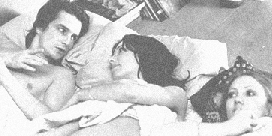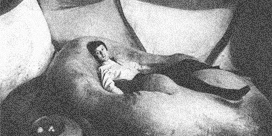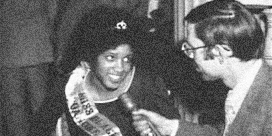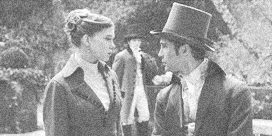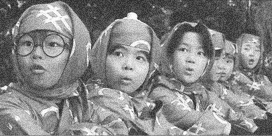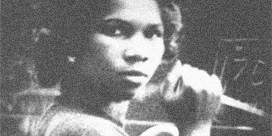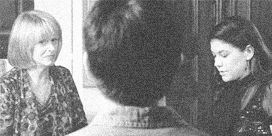October Seventh Two-Thousand Eleven
by Victoria Large Several weeks before the release of the comedy 50/50, I was confronted by an advertisement for the film on YouTube, the type that pops up, unbidden, before whatever ridiculous cat video you’ve actually elected to see. I use the word “confronted” because up until that point I had purposely avoided most of the promotion for the film, despite the positive buzz behind it and my fondness for its star Joseph Gordon-Levitt, a gifted actor who frequently selects interesting projects. I knew the film’s premise – its twentysomething protagonist Adam, played by Levitt, is diagnosed with cancer and has a 50% chance of survival – and as a result I was deeply ambivalent about the project. I had lost a loved one to cancer a few months earlier and was still wincing at the word.
But something compelled me to watch the ad: the subject matter that threatened to keep me away from the film also filled me with powerful curiosity. So I watched. And, during the clip where Adam attempts to use his illness to interest women (“I have cancer,” turns out to be a dreadful pickup line.), I surprised myself by laughing out loud. Not long after that, I passed by the film’s striking poster – an image of Adam shaving his own head – with a friend who, knowing I was a fan of Levitt’s, tentatively asked me if I was interested in seeing the film. “I think so,” I replied quietly. (Later, I would read industry columns arguing that despite the film’s good reviews, 50/50’s box office was hampered by its subject matter, columns suggesting that people wanted escapism, which this film certainly is not. I’m very much aware that I’m far from being the only one whose uncertainty about the film’s premise was rooted in real life grief.)
I ended up going to a matinee on my own, a week after 50/50’s initial release. I felt unaccountably brave when I said the name of the movie to the woman working at the box office, and took some deep breaths when it started. Why was I doing this? Perhaps I knew that, if 50/50 got it right, it would be exactly the film that I needed to see. I like gutsy films. I try to be the kind of gutsy filmgoer that gutsy films deserve. So there I was. I didn’t know then, because I had so scrupulously avoided the press surrounding the movie, even after catching that trailer on YouTube, but 50/50 was based on screenwriter Will Reiser’s own experience with cancer. But even without that knowledge, I recognized a refreshing authenticity and blessed freedom from sentimentality in Reiser’s screenplay and Jonathan Levine’s crisp direction.
It’s difficult to write about the film without lapsing into a catalog of moments that have lingered with me. There’s an overcautious pre-diagnosis Adam jogging in place, waiting for a traffic light to change even though no cars are coming. There’s Adam’s fiercely protective mother Diane, played to perfection by Anjelica Huston, icily intoning, “My son has cancer,” after unsuccessfully requesting that the doctor’s office turn down their air conditioning. There’s the quietly sweet moment where Adam discovers a dog-eared copy of a book called Facing Cancer Together in his friend Kyle’s bathroom. (Kyle is played by Reiser’s real-life friend Seth Rogen, who is excellent in a part that was written for him). Perhaps most emblematically, there’s the scene where the normally straight-laced Adam strolls down a hospital corridor high on medicinal marijuana and giggling at everything. Faced with an orderly wheeling a body bag down the hallway on a gurney, Adam appears chastened for a beat: then breaks into another drug-induced fit of giggles. 50/50 is a film with heart and bite, one that knows that life is made up of moments of absurdity and compassion and pain, sometimes all at once. The cast, especially Levitt, deserved Oscar consideration, and so did Reiser.
But I know that my urge to write about THIS film as I reflect on THIS year is wrapped up in a lot more than my love of a good movie. Josh Tyler, a writer for Cinema Blend and a cancer survivor himself, wrote an eloquent and impassioned post in October urging readers to see 50/50:
Unlike any other kind of cancer movie you’ve ever sat through, you’ll walk out of 50/50 less afraid of the disease than you were when you came in. Not because the film makes it seem any less horrible than it is, in fact I’d say it’s better at dealing with the realities of cancer than almost any other movie in recent memory, but because 50/50 makes it clear that no matter how bad the cancer is, you can be stronger. You can deal. It doesn’t matter if it wins, you’ll always be the victor. And if you see 50/50, after one-hundred minutes of humor and emotion and maybe even a few tears, you’ll walk out a stronger person than you were when you went in.
I like the idea that this film has the potential to make people stronger. I think it does. But that isn’t quite how I would have articulated my feelings immediately after the credits rolled on my matinee screening of 50/50. More than anything, I felt grateful. Grateful that I had connected with an excellent film, sure, but grateful for everything else, too. I felt grateful for the sunny autumn afternoon just outside the theater. Grateful to run a few errands on the way home. Grateful to fold my laundry later in the day. It’s tough to explain this without sounding cliché, but 50/50 is a film that somehow pushes you to see what you have, what you’ve been blessed with, and not what you stand to lose. Not what you’ve lost. As 2011 comes to a close, I’m not really looking to name a “best” film of the year. But I will say that on the particular day that I encountered it, in the particular year that I encountered it, 50/50 mattered a lot.









